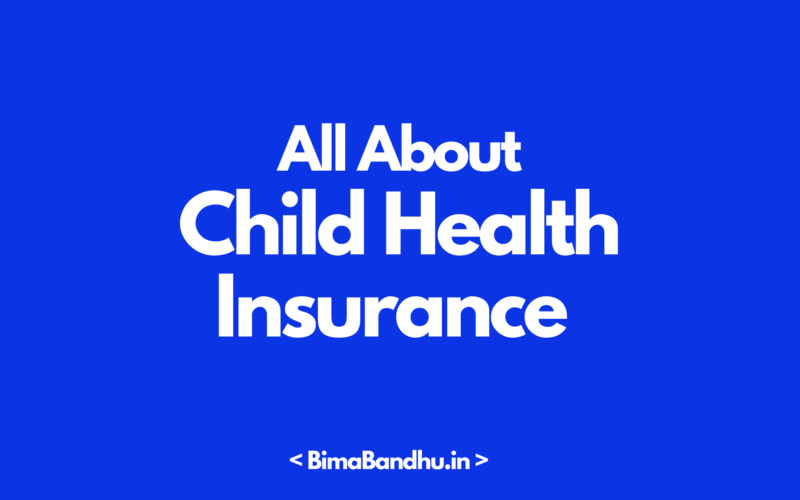‘Health is wealth’ is a popular adage we all have heard of at some point in our lives. When it comes to our children, this wealth takes on a profound meaning. Child healthcare is evolving rapidly, with medical advancements offering unprecedented opportunities for better treatment and care. Yet, the rising costs associated with healthcare can be a challenge for any family. This is where the importance of child health insurance plans becomes imperative.
According to WHO statistics, out-of-pocket expenditure has dropped from 69.07% in 2013 to 50.59% in 2020. This significant drop showcases a grim picture around healthcare in the country. In the absence of a comprehensive health insurance plan, this financial burden can be overwhelming, potentially affecting a child’s health and the financial stability of the family.
You can think of health insurance for children as a safety net that shields your little ones from the unpredictable twists and turns of health-related challenges. It also ensures that your financial foundation remains strong. A thoughtfully chosen child health insurance plan can shield against the uncertainties life may throw at your child’s well-being.
This guide will take you through different aspects of child health insurance plans.
What is Child Health Insurance?
Child health insurance is a specialized form of health insurance coverage designed to safeguard the well-being of the youngest members of our society. It is a financial safety net that parents and guardians can weave around their children for protection against the unpredictable nature of health-related expenses.
In essence, health insurance for children serves as a shield, ensuring that your child receives timely and adequate medical care without imposing a crippling financial burden on the family. These insurance plans cover a range of healthcare services, including preventive care, doctor visits, hospitalizations, surgeries, and more.
Why Should You Buy Child Health Insurance Plans?
Ensuring the well-being of your child is undoubtedly one of the most profound responsibilities of parenthood. While the journey of parenting is filled with joy and love, it is equally marked by the unpredictability of life. Child health insurance plans can serve as a crucial tool, offering many reasons why investing in them is not just wise but imperative. These include:
-
Mitigating the risks of injuries
Children, driven by their boundless energy and curiosity, are prone to accidents and injuries. The potential for unexpected medical expenses is a reality, from playground mishaps to sports-related incidents. Affordable health insurance for children offers financial protection, ensuring that necessary medical care is accessible without adding strain to your family’s budget.
-
Addressing weaker immunity
Children, especially in their formative years, may have developing-immune systems that render them susceptible to illnesses. Most child health insurance policies prioritize preventive care, including vaccinations and regular check-ups. This can improve your child’s immunity and reduce the likelihood of falling prey to preventable diseases.
-
Navigating higher risk exposure
Whether it’s exposure to contagious illnesses in school or environmental factors, children often find themselves at a higher risk of health-related challenges. A child health insurance plan can provide a comprehensive shield, covering a range of medical services from routine care to specialized treatments. This can ensure protection for your child against the uncertainties of higher risk exposure.
-
Catering to lifestyle habits
Children, like adults, develop lifestyle habits that can impact their health. From dietary choices to physical activities, these habits are crucial to their overall well-being. Health insurance plans recognize the influence of lifestyle on health and offer coverage that caters to the unique needs of growing children, encouraging healthy habits and providing support when needed.
-
Peace of Mind for parents
Parenthood is often marked by uncertainties, and health-related concerns can be particularly stressful. Health insurance for children can safeguard your child’s health and provide peace of mind to you. This can help you navigate the journey of parenthood with confidence, knowing that their child’s health is protected.
-
Investing in a resilient future
Investing in child health insurance can address immediate health concerns while also laying the groundwork for a resilient future. Early interventions, preventive care, and comprehensive coverage contribute to your child’s overall development, setting the stage for a healthy and flourishing adulthood.
Types of Children Health Insurance Plans in India
Here’s a breakdown of the types of child health insurance plans you may encounter:
-
Family floater plans
Family floater health insurance plans cover the entire family under a single policy, making them a practical choice for parents seeking comprehensive coverage for themselves and their children. These plans typically include coverage for hospitalization, surgeries, and other medical expenses.
-
Individual child health insurance plans
These plans are tailored specifically for children and offer coverage for various healthcare services, including routine check-ups, hospitalization, etc. Individual child plans are designed to address the unique healthcare needs of children and provide financial protection against unforeseen medical expenses.
-
Critical illness plans
Critical illness plans for children provide coverage for specific life-threatening illnesses or medical conditions. In the unfortunate event of a covered critical illness diagnosis, these plans offer a lump-sum payout, assisting in managing the associated medical costs.
Read More: List of IRDAI-Approved Health Insurance Companies in India
Inclusions of Health Insurance for Children
The following table covers the general inclusions of some of the best health insurance for children in India:
| Inclusions | Details |
| Hospitalization expenses | Coverage for room charges, nursing, and boarding during hospital stays |
| Preventive care and vaccinations | Inclusive of routine check-ups and vaccinations essential for maintaining a child’s health |
| Daycare procedures | Coverage for minor surgeries, diagnostic tests, and treatments conducted in a daycare unit |
| Critical illness coverage | Financial support in the event of a covered critical illness diagnosis through a lump-sum payout |
| Ambulance charges | Coverage for ambulance charges to ensure swift and safe transportation during a medical emergency |
| Specialist consultations | Specialized medical care, including consultations |
| Diagnostic tests | Coverage for a range of diagnostic tests and imaging procedures, ensuring accurate and timely medical assessments |
| Dental and optical care | Inclusion of dental and optical care, covering routine check-ups, treatments, and the cost of prescription eyeglasses |
| Maternity and newborn care | Maternity coverage for childbirth-related expenses and potential extension to cover newborns’ healthcare needs |
Exclusions of a Child Health Insurance Policy
Here’s an overview of common exclusions in a child health insurance policy:
| Exclusions | Details |
| Pre-existing conditions | Medical conditions that existed before the commencement of the insurance policy may be excluded from coverage. |
| Non-medical expenses | Certain non-medical expenses, such as cosmetic procedures, health supplements, and alternative therapies, may not be covered. |
| Intentional self-Injury | Injuries resulting from intentional self-harm or participation in hazardous activities may be excluded from coverage. |
| Congenital conditions | Some health insurance plans may exclude coverage for congenital conditions or birth defects present at the time of birth. |
| Experimental and unproven treatments | Procedures/treatments that are considered experimental or unproven may not be covered by the insurance policy. |
| War or acts of terrorism | Injuries or illnesses resulting from war, acts of terrorism, or participation in related activities may be excluded. |
| Injuries under the influence | Injuries that occured while under the influence of alcohol or drugs may not be covered. |
| Injuries from hazardous sports | Participation in certain hazardous sports or activities may lead to exclusion of injuries resulting from such participation. |
| Non-disclosure of material information | Failure to disclose material information during policy application may lead to exclusions or rejection of claims. |
| Non-adherence to medical advice | If the insured child fails to follow prescribed medical advice, resulting complications may not be covered. |
| Specific waiting periods | Some plans may have waiting periods for specific conditions, and coverage may not be immediate after policy initiation. |
Also Read: All About Waiting Period in Health Insurance
7 Benefits of Child Health Insurance for Parents
Investing in health insurance for children safeguards their well-being and offers a myriad of benefits for parents. Here’s a glimpse of its advantages for parents:
- Financial security
Child health insurance provides a financial safety net, shielding parents from the potentially overwhelming healthcare costs. It can help prevent a sudden strain on the family budget.
- Reduced stress
Knowing that a health insurance plan covers your child brings peace of mind. It alleviates the stress associated with the uncertainties of managing unforeseen medical expenses.
- Timely access to quality healthcare
Child health insurance also ensures that you provide timely and quality healthcare for your children without delays or compromises. This proactive approach contributes to better health outcomes.
- Focus on child’s well-being
With the financial aspects of healthcare covered, parents can direct their focus and energy towards their child’s well-being, fostering a nurturing environment for growth and development.
- Easy access to specialized care
Access to child specialists and tailored healthcare services for children is often included in child health insurance plans. This ensures that parents can afford necessary specialized care when needed.
- Support during critical illnesses
Child health insurance plans provide financial support to manage medical costs, in the unfortunate event of a critical illness diagnosis.
- Ease of policy customization
Parents can choose from a variety of health insurance plans for children based on their family’s unique needs. This flexibility allows customization to align with specific healthcare requirements.
Eligibility Criteria for Children Health Insurance
| Criteria | Details |
| Minimum entry age | 91 days (1 day for newborn babies to ensure immediate coverage) |
| Maximum entry age | Up to 25 years |
| Exit age | When the child is no longer dependent on his/her parent financially |
| Coverage for children below five years | Covered if one parent is covered under the health plan at least |
**Eligibility criteria may vary between different child health insurance plans.
Tips to Select the Best Health Insurance for Children in India
Choosing the best health insurance for children is a significant decision that requires careful consideration. Here are some valuable tips you can keep in mind:
- Understand your child’s healthcare needs
Assess your child’s healthcare requirements and consider your age, medical history, and any specific health concerns. This will help you choose a plan that aligns with your child’s unique needs.
- Evaluate inclusions and exclusions
Thoroughly review the inclusions and exclusions of each child health insurance plan. Ensure the plan covers essential aspects like hospitalization, daycare procedures, preventive care, and critical illnesses. Be aware of any specific exclusions that might impact your child’s coverage.
- Check network hospitals
Verify the list of network hospitals associated with the insurance provider. Having a network of hospitals nearby can facilitate easy access to quality healthcare services when needed.
- Consider waiting periods
Understand the waiting periods associated with different coverages. Some plans may have waiting periods for specific conditions or treatments. Clarify the waiting periods to manage expectations regarding when certain benefits become available.
- Review claim settlement ratio
Research the claim settlement ratio of different insurance providers. A higher claim settlement ratio may indicate the insurer’s efficiency in processing and approving claims.
- Assess premium costs
Compare premium costs across different plans while ensuring the coverage meets your child’s healthcare needs. Consider the balance between affordability and comprehensive coverage.
- Look for add-on riders
Explore the availability of add-on riders that can enhance the coverage of the basic plan. Riders, such as for critical illness or maternity cover, can provide additional protection for specific health-related scenarios.
- Check co-payment and sub-limits
Co-payment is the percentage of medical expenses that you need to bear, while sub-limits cap the coverage for certain medical services. Understand these limits within the policy to decide better.
- Read customer reviews
Research customer reviews and feedback about the insurance provider. Real-life experiences from other policyholders can offer insights into the company’s customer service, claim settlement process, and overall satisfaction.
- Consult an insurance advisor
Seeking guidance from an insurance advisor can be beneficial, especially when navigating the complexities of health insurance. An advisor can help you understand the fine print, compare plans, and make an informed decision based on your child’s needs.
Common Mistakes to Avoid When Buying Child Health Insurance
- Overlooking what’s covered and excluded in the policy
- Neglecting to check waiting periods
- Ignoring co-payment and sub-limits details
- Not checking the list of network hospitals for accessing quality healthcare
- Selecting a plan solely based on low premiums without considering coverage adequacy
- Skipping customer reviews may leave you unaware of potential issues with customer service or claims processing
- Opting for a plan solely due to brand name without assessing specific features
- Failing to anticipate future healthcare needs
FAQs
How much is health insurance for a child?
The cost of health insurance for a child can vary based on factors such as the child’s age, health condition, coverage needs, and the specific insurance plan chosen. Generally, child health insurance premiums are lower compared to adult plans. You can compare quotes from different insurance providers to find a plan that suits your budget while offering comprehensive coverage for your child’s needs.
How to get health insurance for my child?
To get health insurance for your child, start by researching and comparing plans from different insurance providers. Understand the eligibility criteria, gather necessary documents like your child’s birth certificate, and choose a reputable insurance provider. Contact insurance agents or brokers for guidance, and fill out the application form with the required information.
Where can I get health insurance for children?
You can obtain health insurance for children online or offline from insurance providers, insurance brokers, and local insurance agents. Compare options to find a plan that aligns with your child’s healthcare needs and your budget.
What will happen to the child health insurance policy if the child turns 18 years old?
When a child covered under a health insurance policy turns 18, the policy dynamics may change. In some cases, the child may need to transition to an individual health insurance plan, as they may no longer qualify as a dependent under their parent’s policy. The specific changes depend on the terms and conditions of the insurance provider and the policy in question. Therefore, it’s advisable to contact the insurance provider well in advance of the child turning 18 to understand the options available.
Are there any waiting periods under child health insurance plans?
Yes, child health insurance plans may have waiting periods for certain coverages. The duration of waiting periods can vary between insurance providers and policies. You need to carefully review the terms and conditions of the chosen child health insurance plan to understand any waiting periods associated with particular coverages.
What is the right time to buy health insurance for kids?
The right time to buy health insurance for kids is as early as possible. Ideally, parents should consider purchasing health insurance for their children soon after birth. By doing so, you can ensure continuous coverage from an early age, and any potential health issues that may arise can be covered.
Do children have to undergo pre-policy medical check-ups?
In most cases, children do not have to undergo pre-policy medical check-ups when applying for child health insurance. Unlike adults, insurance providers do not require medical examinations for children as a part of the application process.






